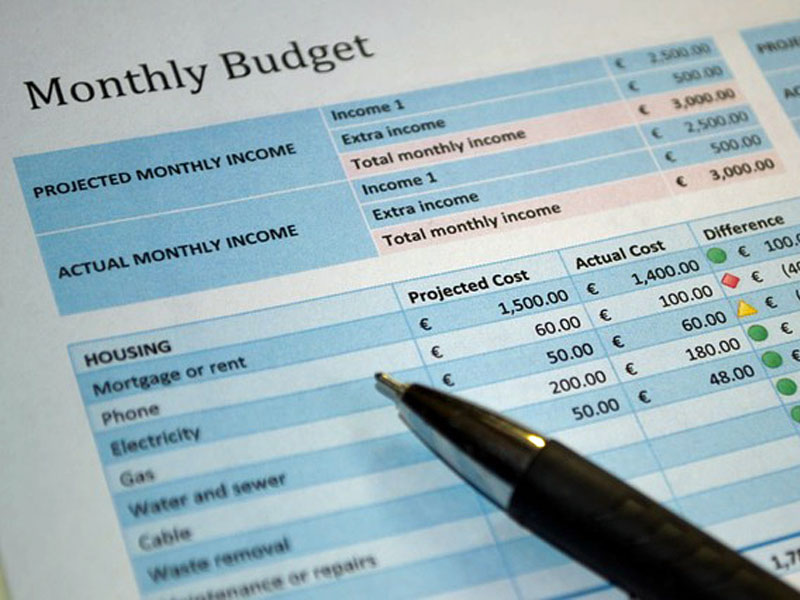Welcome! You are currently browsing the site as a guest. Please log in or create a free account to see more.
Budgeting Tips for Newlyweds

Setting Financial Goals Together
When it comes to managing money as a couple, establishing your financial goals is a crucial first step. Not only does it create a roadmap for your future, but it also strengthens your bond by fostering teamwork and accountability. Working together on your financial aspirations can significantly enhance communication and reduce potential conflicts down the line.
Start by discussing your long-term and short-term goals. Long-term goals might include saving for a house, planning for future education, or even starting a family. These are dreams that can take years to realize, requiring you to have a steadfast commitment to your budget. On the other hand, short-term goals can include paying off debts or planning that dream vacation you’ve both been talking about. These goals provide immediate motivation and satisfaction as you see progress more quickly.
Effective communication is key when setting these goals. Be honest about your financial situation, desires, and any concerns you may have. It’s essential that both of you feel heard and valued in this process. Setting a regular time each month to review your goals is also a good practice; it ensures you stay aligned and can adjust as life changes. Don’t shy away from revisiting and revising your goals. Life is dynamic, and your financial aspirations should reflect that.
To document and track your goals, consider using budgeting tools or apps that allow both of you to contribute and stay updated. Create shared spreadsheets or simple charts on paper that visually represent your progress. For instance, you might have a chart showing how close you are to your emergency fund or how much debt you’ve paid off this year. This not only helps to keep you accountable but also gives you a sense of accomplishment as you watch your dreams become more tangible.
Building Your Savings
Saving money is not just about stashing away a few extra bucks here and there; it's about laying a solid foundation for a secure financial future together as a couple. With a shared vision of what you want to accomplish, saving becomes more than a task—it transforms into a shared journey toward reaching your financial goals.
Having specific savings accounts can make a significant difference in managing your finances. Consider creating a variety of accounts tailored to your needs, such as a high-yield savings account that earns interest while you save, an emergency fund to cover unexpected costs, or a vacation fund to help you plan that dream getaway without breaking the bank. Each account serves a distinct purpose and helps keep your savings organized and focused.
To maximize your savings, create strategies that work for both of you. One effective approach is setting up automated transfers to your savings accounts. By automating this process, you ensure that money is consistently put aside before you even think about spending it. It's amazing how quickly your savings can grow when you make it a priority and have a plan in place!
Establishing milestones can also turn savings into a fun challenge for both of you. For instance, set a target to save a certain amount by the end of each month or create a goal for a significant purchase, like a house or a major vacation. Celebrating those milestones together can strengthen your bond and motivate you to keep going.
Ultimately, having a robust savings plan will help you turn your dreams into reality. Whether it’s buying a home, traveling the world, or simply feeling secure in unpredictable times, your shared commitment to saving will pave the way for a stable and fulfilling financial future together.
Creating and Tracking Your Budget
Once you and your partner understand the importance of budgeting, the next step is to create a budget that works for both of you. Start by assessing your combined income and monthly expenses. It can be helpful to sit down together with a notepad or spreadsheet and list out all sources of income—salaries, side gigs, or any other revenue streams. Then, tackle your expenses.
Divide your expenses into fixed costs, like rent or mortgage, utilities, and insurance, and variable costs, such as groceries, dining out, and entertainment. This clear categorization will help you see where your money is going and identify areas where you might be overspending.
To make budgeting easier, consider using budgeting tools or apps like Mint or YNAB (You Need A Budget). These platforms can help automate your budget tracking and allow both partners to stay updated in real-time. Thorough tracking can not only ease your financial stress but also foster a sense of teamwork as you work toward shared goals.
Regularly reviewing and adjusting your budget is equally important, especially as life circumstances change. Whether you're anticipating a new job, planning to have children, or saving for a home, keeping an open line of communication about your financial situation is key. Schedule monthly budget check-ins where you both can assess what's working and what needs adjustment. This proactive approach will help prevent future conflicts over money and ensure that both of you are on the same page.
Remember, budgeting isn’t just about crunching numbers; it’s about building a financial future together. By engaging in this process, you’re setting a strong foundation for your marriage, allowing you to tackle financial challenges as a team.
Establishing an Emergency Fund
In any marriage, financial surprises can pop up unexpectedly, whether it's a sudden car repair, medical bills, or even job loss. This is why establishing an emergency fund is crucial. An emergency fund acts as a financial safety net, helping you navigate life's unexpected challenges without derailing your budget or peace of mind.
So, how much should you save? A good guideline is to aim for three to six months' worth of living expenses. This amount can differ based on your personal circumstances, like job stability or family size, but having a cushion to fall back on is essential for both of you.
Building an emergency fund as a couple can be rewarding and strengthen your partnership. Start by discussing your financial goals and priorities together. Decide how much you can comfortably set aside each month. Whether it’s $50 or $500, the key is consistency. You can set up a separate savings account specifically for this purpose, making it easier to track your progress and resist the temptation to dip into those funds for non-emergencies.
When working out your budget, prioritize your emergency savings. Consider treating your monthly savings contribution as a fixed expense—similar to rent or utilities. This helps ensure that it doesn't get overlooked when other spending pressures arise.
Lastly, know when to use the emergency fund. It should only be tapped for genuine emergencies, not unexpected splurges or planned expenses like vacations. Having a clear understanding of what qualifies as an emergency can help you both feel secure in your financial decisions, fostering trust and a sense of teamwork in your money matters. Building and maintaining an emergency fund together is not just about saving; it's about ensuring both partners feel safe and prepared for whatever life throws your way.
Managing and Reducing Debt
Debt can feel like a huge weight on your relationship, especially when you’re trying to build a future together. It's essential to understand the different types of debt that may affect your financial situation, such as credit card debt, student loans, and personal loans. Each has its own implications, and knowing the distinctions will help you manage them more effectively.
To avoid accumulating unnecessary debt, set clear financial goals together and develop a spending plan that aligns with those objectives. Regularly reviewing your budget can help you identify areas where you can cut back, leading to savings that can be allocated toward paying off existing debts. It's crucial to live within your means and resist the temptation of overspending, especially on non-essential purchases.
Debt can hinder your ability to reach your long-term financial goals, such as buying a home or saving for retirement. The interest on certain debts can spiral out of control, further complicating your financial landscape. Therefore, having a solid strategy for paying down debt is vital. Start by prioritizing high-interest debts, such as credit cards, and consider using methods like the snowball or avalanche approach to tackle them effectively.
As you work together to get a handle on your debt, maintaining open communication is critical. Make it a habit to discuss your finances regularly—addressing any concerns or questions that may arise about money management. Transparency will not only help you stay on track but will also strengthen your bond as a couple.
Ultimately, managing and reducing debt is about teamwork. Celebrate small victories as you pay down balances and keep reminding each other of the bigger financial goals you’re striving to achieve together.
Encouraging Open Communication About Finances
Money can often be a sensitive topic in a marriage, but open dialogue about finances is essential for a healthy relationship. Being able to discuss your financial situation helps build trust and ensures that both partners feel heard and understood.
One effective way to promote communication is by setting up regular financial meetings. You might want to do this weekly or monthly, depending on your schedules. These meetings can help you review your spending, update your budget, and plan for upcoming expenses. It creates a space where both partners can voice their thoughts without the pressure of immediate decision-making.
It’s also important to acknowledge that you may come from different backgrounds, which can shape your attitudes towards money. Some people may prioritize saving, while others might be more inclined to spend. Discussing these differing perspectives can lead to a better understanding of each other’s motivations and values. This understanding is crucial in creating a budget that resonates with both partners.
When financial disagreements do arise, having conflict resolution strategies in place can make a big difference. Instead of letting arguments escalate, practice active listening – really hear what your partner is saying. Focus on finding common ground, and remember that compromise is key. You might also consider setting aside time for brainstorming solutions together rather than assigning blame.
Lastly, building trust through transparency cannot be overstated. Share your financial goals, debts, and spending habits honestly. This openness fosters a sense of partnership and accountability, reinforcing that you're in this together. In the end, encouraging open communication about finances isn’t just about managing money; it’s about nurturing your bond and ensuring your marriage thrives.
Adjusting Your Budgeting Tips Over Time
When you’re married, life is full of surprises. Financial circumstances can shift dramatically due to job changes, children coming into the picture, or unexpected expenses. That’s why it’s essential to understand that your budget should be a living document that evolves as your life progresses. Regularly revisiting your financial goals ensures that you’re on the same page and set up for success.
Consider scheduling periodic budget reviews—maybe once a month or quarterly—where you can sit down together and assess your finances. During these reviews, discuss any changes in income or expenses, and don’t forget to celebrate the financial milestones that you've reached together. This practice not only keeps your budget relevant but also reinforces your partnership.
As your income increases or shifts—whether through promotions, new job opportunities, or even bonuses—don’t forget to adapt your savings strategies. You might want to allocate a bit more toward savings or even consider investing for the long-term. Talk about your goals as a couple—whether you’re aiming to buy a house, save for a dream vacation, or plan for your kids' education. This way, you can use the extra funds to work towards something meaningful together.
Communication is key. Keep the conversation about finances ongoing. When life changes, such as welcoming a new child or navigating a career transition, make sure you both feel comfortable discussing how these changes affect your budget. This proactive approach not only helps you stay financially savvy but also strengthens your bond as partners. Financial success in marriage is not just about the numbers; it's about growing together.
Welcome! You are currently browsing the site as a guest. Please log in or create a free account to see more.








